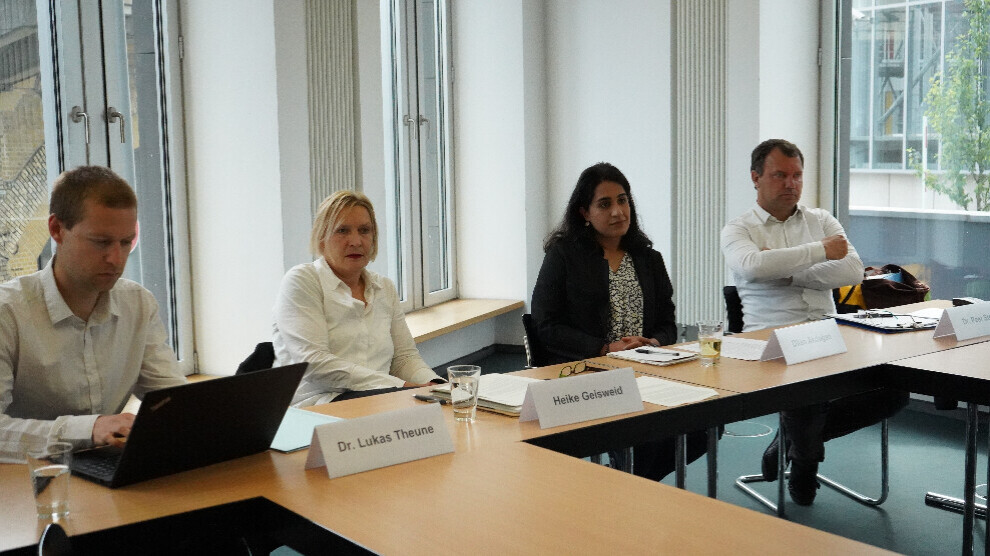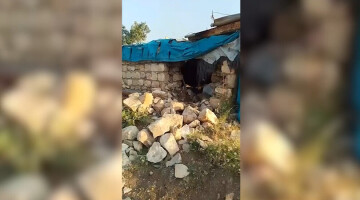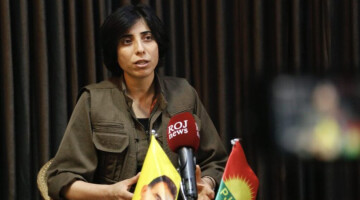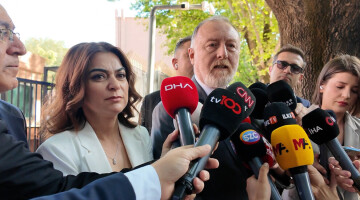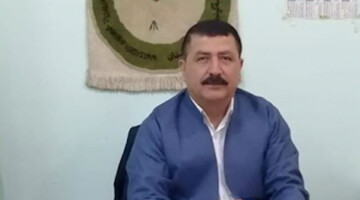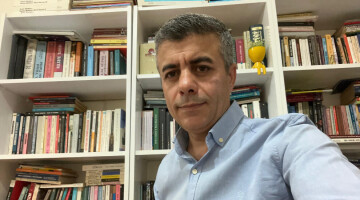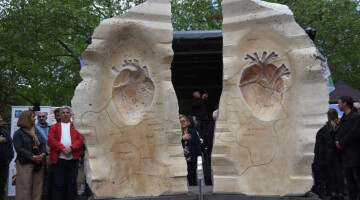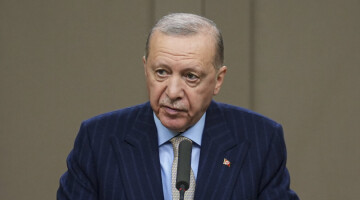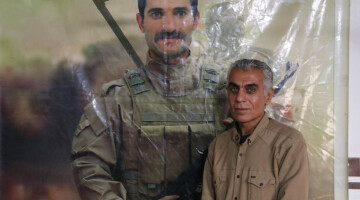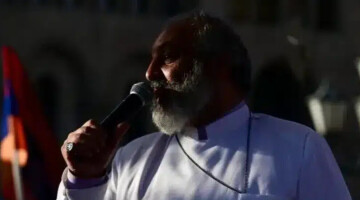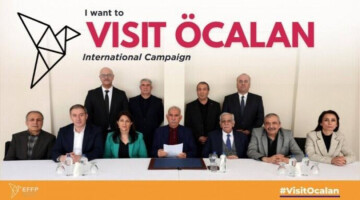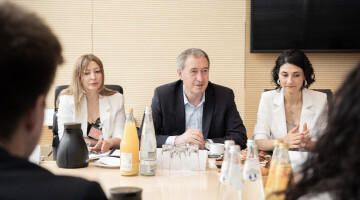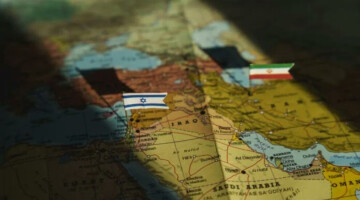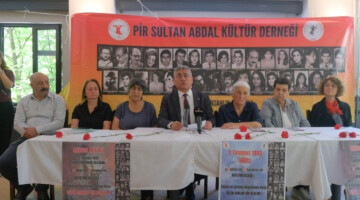Lawyers Dr. Lukas Theune and Dr. Peer Stolle have submitted an application to the Federal Ministry of the Interior to lift the ban on the activities of the Kurdistan Workers' Party (PKK). Afterwards, the lawyers informed about the background of their application in the House of the Federal Press Conference. The press conference was organized by the Association for Democracy and International Law (MAF-DAD) and moderated by attorney Heike Geisweid. Dilan Akdoğan spoke on behalf of the Kurdish community in Germany, which has been criminalized by the PKK ban.
The ban on PKK activities in Germany was issued on November 26, 1993 by the then Federal Minister of the Interior Manfred Kanther. At the press conference, it was explained that the circumstances have changed since 1993 and that maintaining the ban can no longer be justified. It was pointed out that the PKK does not commit any crimes in Germany and therefore does not pose a threat to internal security. While the organization's ideas and goals have also changed since then, in Turkey, on the other hand, a regime emerged that trampled democratic principles underfoot.
Dilan Akdoğan welcomed the motion to lift the ban and explained the consequences for Kurds living in Germany: "For decades, the Kurdish community living in Germany has been deliberately criminalized by the German authorities on the basis of the ban on activities issued in 1993. While most immigrants in Germany are able to exercise their cultural identity - for example by founding associations, media and cultural institutions - undisturbed, Kurdish political, cultural and social activities are under general suspicion of so-called PKK involvement. The consequences are continuous surveillance, defamation and criminalization of almost all Kurdish activities in Germany. This repeatedly results in significant encroachments on fundamental rights - such as freedom of assembly or freedom of expression."
According to Dilan Akdoğan, the German state uses different methods of repression, which also have different effects on the politically active individuals: "In this context, Halim Dener, who was shot dead by a German police officer while posting a PKK flag in Hanover on June 29, 1994, should be mentioned in particular. In addition, Kurdish activists have been and continue to be sentenced to long prison terms on the basis of §§ 129 a/b of the StGB. In doing so, they cannot be proven to have committed individual crimes; all they are charged with is, for example, organizing demonstrations or collecting donations, which was also the doom of the Kurdish activist Özgür A. just the week before. Very often, people also have to reckon with consequences under residence or citizenship law because of their political activity. Participation in demonstrations is often enough to defame people as enemies of our constitution and to revoke their residence permit or even deport them on this basis. For example, Murat Akgül, who has lived in Nuremberg for over 20 years and is the father of four children, was deported to Turkey in May 2019 after the Office for the Protection of the Constitution contacted the Foreigners Authority with 'security-relevant findings' and the Foreigners Authority then ordered the deportation of the 59-year-old.
Recently, the display of the symbols of the PKK and the image of the Kurdish leader, Mr. Abdullah Öcalan, have also been banned in Germany, which repeatedly leads to people being sanctioned for violations of the Assembly Act or the Law on Associations. The solidarity of German citizens with the Kurdish movement is also increasingly targeted by the persecuting authorities. The registration of demonstrations is used as a basis for revoking people's identity documents. This is what happened to Uli, a 24-year-old student here in Berlin, who last year registered a large demonstration for the lifting of the PKK ban."
"I was five years old"
Dilan Akdoğan went on to say that she had also personally been confronted with repression since her childhood: "I can still remember a situation from my childhood very well, in which we wanted to attend the Kurdish Newroz Festival in Cologne in 1996 full of anticipation and in our traditional Kurdish clothes, but this was banned by the German authorities and ultimately my father was taken away in front of my eyes and the eyes of my younger brother by having his hands tied behind his back with cable ties. I was five, my brother three years old. The policemen, known in common parlance as friends and helpers, always had negative connotations for Kurdish children, and they were the ones we were afraid of, and at the same time the ones toward whom we felt anger."
This practice of prohibition has been passed on from generation to generation: "Thus, we as a Kurdish society have experienced systematic political, social and cultural exclusion since the existence of the ban. We feel ignored, marginalized and discriminated against. We have the constant feeling that we are not taken seriously in our concerns. This attitude of the German state towards our community leads us to feel pressured to make a decision, the decision to turn away from our political and cultural identity and deny it, or to deliberately expose ourselves to repression and not submit. An attempt is being made to create Kurds who allow themselves to be defined as foreign, who are only accepted by the German authorities and institutions if they deny their cultural history and social truth, which make them who they are. Thus, the German state is basically continuing the policy that the Turkish state started. Kurds who suffered state repression by the Turkish state and sought refuge in Germany precisely because they did not deny themselves and stood behind their identity were and are confronted here in Germany with the same methods that the Turkish state used. The trauma of oppression and exclusion is thus continued.
It was actually hoped that a country like Germany, which repeatedly emphasizes democratic values and positions itself on the side of human rights, would also grant these human rights to the Kurds.
We regard the practice of banning the Kurds, which has been going on for decades, as a democratic deficit of the Federal Republic of Germany that must be overcome as soon as possible. It prevents the social participation and integration of our society in Germany, because we are portrayed as so-called endangerers or enemies of the constitution, although we do nothing but make use of our basic and human rights. Part of a pluralistic society is listening to each other, but this ban leads to a demonization of our society and does not allow us to be heard."
Turkey's wars of aggression in violation of international law
In addition, the ban on PKK activities also strengthens the back of the Turkish state for waging wars in violation of international law, according to Dilan Akdoğan: "Currently, the Turkish state is carrying out a military invasion in northern Iraq in violation of international law under the guise of fighting terrorism. In the process, any Kurdish gains are targeted by the Turkish state. Also in this connection one recognizes again the positioning of the German state behind Turkey, by taking over the explanations of the Turkish state in view of the current war unquestioningly. The Kurdish perspective, on the other hand, is completely ignored and blanked out.
In this senseü we are of the opinion that a rethinking of the German state is necessary with regard to the Kurdish movement and with it also with regard to the Kurdish society. If the federal republic were to show that it takes Kurdish concerns seriously and accepts the Kurdish side as a party in an armed conflict by lifting the ban on activities, this would send a signal to Turkey and deprive it of the basis for legitimizing the waging of wars that violate international law.
"The Kurdish question can only be solved through dialogue”
Against this background, we believe that lifting the ban on the PKK's activities will help both to eliminate the democratic deficit in Germany and to lift the Kurds' social barrier to their integration and participation, as well as to send a signal to the Turkish government to resolve this conflict through dialogue. The experience of decades of conflict between the Kurds and the Turkish state has shown that a military solution to the conflict is impossible. The Kurdish question can only be resolved through dialogue. Against this background, our expectation is also directed at the German government: use your economic strength to act as an initiator of peace, symbolize to the Turkish state by decriminalizing the Kurdish movement that it has to take the Kurdish side and its democratization efforts seriously. Make a contribution to end the war in Kurdistan and in Turkey and to pull Turkey by the opening of the dialogue way on a more democratic platform, because Turkey left the level of a democratic constitutional state already long ago. A more stable and democratic Turkey is also in the interest of the German state.
Do not hide the war crimes that the Turkish state commits every day. The PKK must be understood as the result of Turkey's decades-long policy of oppression and denial. Ignoring the background of the conflict will not lead to a solution. Rather, an intensive discourse with those affected is necessary. A discourse with Kurdish society is necessary. We as Kurdish society are ready for dialogue. We want to live up to our responsibility and, as a part of the society living in Germany, we want to help tackle and shape the social problems. We want to be a part of this society without having to pretend, we want to be accepted with our political and cultural identity. And we see this motion to lift the ban as an opportunity to open the path of dialogue.
Our appeal is therefore directed to the Federal Government and to Federal Minister of the Interior Nancy Faeser: The motto of the new government is, after all, 'Dare more progress' - dare progress and grant the request of the PKK to lift the ban on the party, support the aspirations for democracy and self-determination of a society that has been oppressed for centuries."
Demonstration and forum in Berlin
On Saturday, a nationwide demonstration will be held in Berlin under the slogan "Defend Kurdistan - Against Turkish Occupation and U.S. Imperialism." On June 18/19, a forum will be held in Berlin under the slogan "28 years of PKK ban: Now we talk!". At the forum, people will have their say who have been and still are affected by discrimination, stigmatization and repression by state institutions in legal terms.

